Research
Soutenir Les Enfant à la Maison et à l'École / Supporting Children at Home and at School with Economic and Education Interventions
Over the next century the largest increase in the world population will take place in Africa. This fast-rising population will bring major challenges but also significant economic opportunities. Côte d’Ivoire (CIV) ranks 170 of 189 countries in the Human Development Index and is also the largest producer of cocoa in the world. In rural cocoa-
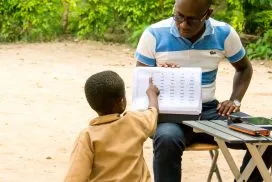
producing communities, poverty is rampant and has reached levels as high as 61.2% (Fonds Monetaire International, 2009), with many households surviving on $1-2 a day (Côte d’Ivoire, 2015). Cocoa accounts for 74% of total income for the average cocoa-growing household in Cote d’Ivoire, creating a great reliance on the crop. The pressure to produce cocoa often means it is a family affair—it is estimated that 1.3 million school-aged children (out of a population of 3.7 million) are working in cocoa production (Tulane University, 2015), largely concentrated in rural areas. At the same time, the government is committed to expanding educational access through universal basic education for all children ages 6-16. Yet educational quality and learning outcomes are very low, especially in cocoa growing regions. The lack of quality and relevant education can also push children out of school and into family farming. In this study, we apply a two-pronged approach to address both poverty and educational outcomes, testing individually and in combination two interventions: cash transfers (CT) and educational-quality improvement. With this integrated approach to poverty-alleviation and education, we aim to maximize the impact interventions on child development, learning, and labor participation, and multiply the magnitude of possibility for rural children in CIV.
Research Team: Dr. Sharon Wolf (UPenn), Dr. Amy Ogan (CMU), Dr. Samuel Kembu Nzale (Lausanne University), Dr. Fabrice Tanoh (UFHB)
Partners: Innovation for Poverty Action, 100WEEKS, Teaching at the Right Level
Funding: Child Learning and Education Facility (CLEF)
Allô Alphabet: Phone-Based Literacy Intervention for Rural, Low-Resource Settings
Learning to read depends not only on having access to education, but on having access to quality education. In this research program, we develop a technology-based literacy intervention program for remote, rural communities of Côte d’Ivoire with the goal of providing quality, evidence-based educational programming via mobile phone to complement the school curriculum. No existing literacy intervention programs in Cote d’Ivoire currently offer scalable solutions to quickly address the problems of widespread student literacy failures. Our interdisciplinary approach combines expertise in literacy development, tech-based education solutions, and human-computer interaction in order to examine how technology-based literacy intervention, and its effective implementation and scalability, can improve literacy outcomes in communities with high illiteracy rates. We combine multiple research tools from the learning sciences (language, cognitive, and literacy assessment, longitudinal neuroimaging of the brain’s reading networks, and evaluation of technology use and integration into the community) to find an optimal and scalable strategy for literacy intervention that can be adopted in Cote d’Ivoire and throughout sub-Saharan Africa.
Ed-Tech tools can thus be useful instruments to complement traditional education, in particular in rural and remote communities. Easy to use, engaging, and cheap Ed-Tech tools, based on equipment that are readily available to families can provide effective support to children in their literacy development. The design of Allô Alphabet is based on previous research on literacy development in rural communities (led by K. Jasinska), and tailored to the rural Ivorian context. Allô Alphabet is (1) designed to be used after-school at home, enabling children who miss school due to agricultural activities to continue to receive literacy instruction and practice, (2) leverages children’s local language knowledge to bootstrap into reading in French by incorporating local language phonological structures, (3) builds phonemic decoding skills in a developmentally-appropriate manner (i.e. following saliency of phonological grain sizes), (4) is adaptive, and (5) provides a voice-based parent access platform accessible to non-literate parents that engages parents in children’s learning. As shown by recent evidence, the larger effect sizes in programs that implement EdTech are however highly dependent on adult interaction (family or teachers/tutors). It is thus crucial that such Ed-Tech programs encompass the whole family in order to provide children with structure, engagement and support throughout their literacy development.
Allô Alphabet is currently undergoing an impact evaluation.
Research Team: Dr. Amy Ogan (Carnegie Mellon University, Co-PI), Dr. Michael Madaio, Dr. Hermann Akpe, Dr. Fabrice Tanoh, Dr. Anicet Konan Nana
Funding: Jacobs Foundation

Girl accessing reading lessons using Allô Alphabet using a simple mobile phone
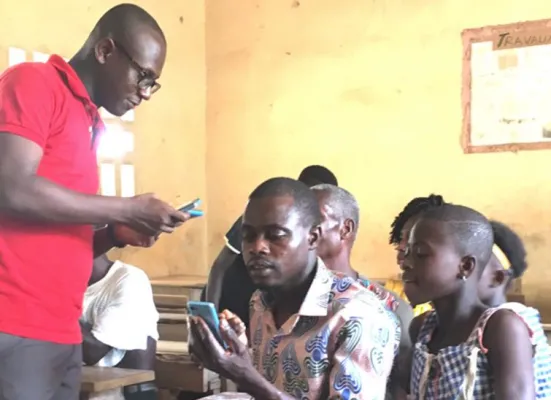
Fabrice Tanoh showing a parent how to use the Allô Alphabet Ed-Tech platform on a mobile phone while his daughter looks on
The Impact of Interrupted Schooling on Neurodevelopment for Reading in Resettled Refugee Children
As children learn to read, brain regions associated with visual and language processing form specialized cortical circuits involving predominantly left-hemisphere occipitotemporal, temporoparietal, and frontal regions—the brain’s ‘reading network’. Reading experience drives the functional neural specialization for reading. To date, the critical role of experience in functional neural specialization has remained unexamined because most research has only examined neurodevelopmental trajectories for reading in children with reading experience— children who begin formal literacy instruction when they enroll in school at a government-mandated age (6 years). Our existing approaches to studying the emergence of reading function in the brain cannot separate the discrete effects of experience and age. An important theoretical advance would be to test how the brain’s reading network forms through reading experience or lack thereof across development. The resettlement of refugee children provides an opportunity to address these outstanding issues. For refugee children, displacement and migration often corresponds to a period of interrupted schooling and limited reading experience. As refugee children of different ages resettle in Canada, they learn a new language and learn to read at school. Individual differences in language and reading experiences among refugee children provide a ‘natural paradigm’ from which we can test specific hypotheses concerning the role of experience in functional neural specialization for reading. We use functional neuroimaging to examine the emergence of neural systems for reading in children who have experienced variable periods of interrupted schooling and resumed schooling/learning to read at different ages. Examining the role of experience in the functional neural specialization for reading will provide important theoretical and practical insights—we gain a deeper understanding of the development of neural systems across diverse developmental experiences, and the changing plasticity of neural systems across development.
Research Partners: Dr. Becky Chen (University of Toronto)
Funding: Connaught New Researcher Award (PI: K. Jasińska); Natural Sciences and Engineering Research Council (NSERC; PI: K. Jasińska)
The Impact of Accelerated Learning Programs on Literacy, Numeracy and Wellbeing in Northeast Nigeria
244 million children are currently out of school worldwide.These children are at high risk of never obtaining functional literacy and numeracy, significantly jeopardizing their futures. There are over 1.1 million internally displaced children between the ages of 5-17 in Nigeria. FastTrack is a technology-enabled and self-assisted accelerated foundational skills development program to support out-of-school refugee children in acquiring functional literacy and numeracy skills (reading, writing and basic arithmetic), which are vital, indispensable foundational skills needed for further education and to lead an empowered, self-determined life.FastTrack is a low-cost remedial learning program aimed at closing learning gaps and building the foundational literacy and numeracy competencies of out-of-school children in either English or in their Indigenous language (Mother Tongue) implemented in marginalized communities with a high population of children who are out of school and do not have access to formal education. The program combines 3 proven, independent teaching and learning approaches: Mavis Talking Book and Pen (an offline digital pen with audio capabilities), targeted instruction; and mother tongue-based literacy acquisition model: a dual language approach which involves using Hausa as a bridge to learn English. Since inception, FastTrack has reached over 18,000 beneficiaries in over 18 refugee camps across 3 Nigerian states. The program is currently being implemented in partnership with the National Commission for Refugees, Migrants and Internally displaced persons (IDPs), Nigeria’s leading agency responsible for the reintegration, rehabilitation and empowerment of displaced children.
This program addresses the impact of the FastTrack program on children’s basic literacy and numeracy skills and other child outcomes, including social-emotional skills, psychological well-being, educational aspirations, and later school enrollment and progression using an RCT.
Research Partners: Dr. Sharon Wolf (UPenn)
Funding: J-PAL
Promoting Literacy Development in Children in Rural Cocoa Producing Communities
How does inconsistent access to language and reading instruction in a new language impact literacy outcomes? How can we best design policies to ameliorate the negative consequence of poverty on literacy? As part of the Transforming Education in Cocoa Communities (TRECC) program and with a team of Ivorian graduate students, we are conducting a cognitive, linguistic, and reading assessment in children growing up in rural cocoa communities in Côte d’Ivoire. We combine behavioral indicators of literacy development with portable neuroimaging using functional Near Infrared Spectroscopy (fNIRS) to shed new light on brain development in impoverished and adverse conditions. Children in these communities face many challenges to learning to read: high poverty rates, poor school attendance, and child labor in cocoa agriculture. Children face the added challenge of learning to read in a new language, French, different from the language spoken in their community. Education is almost exclusively French, while there are over 60 languages spoken in Côte d’Ivoire. Our combined brain-behavior approach allows us to apply the latest tools of cognitive neuroscience to advance the study of global child development.
Research Team: Dr. Hermann Akpé, Dr. Fabrice Tanoh
Funding: Jacobs Foundation
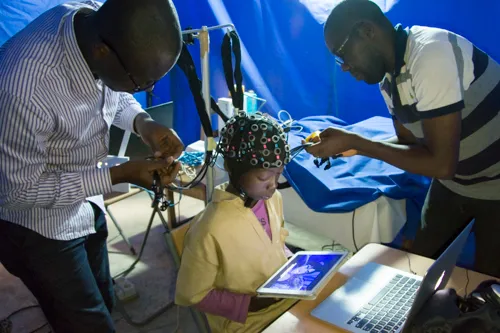
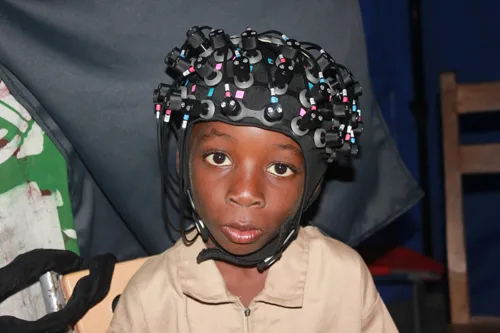
Executive Functions and Reading
Disadvantaged living environments characterized by economic insecurity, nutritional deficiencies, and poor stimulation may undermine development of basic cognitive skills that support academic learning and school success. Executive functions (inhibition, working memory, and cognitive flexibility), are crucial components of cognitive development that support a child’s academic outcomes, including literacy. Executive function development is particularly susceptible to the negative impact of poverty because the brain region that support these skills is late to mature and therefore remains sensitive to environmental effects throughout childhood. Although recent studies have started to show how poverty-related factors affect executive function skills of children growing up in low and middle-income countries (LMICs), the role that executive functions play in promoting academic outcomes in these settings remains poorly understood. In this study, we examine how executive functions support children’s literacy in an environment with high, poverty-related, risk of illiteracy.
Research Team: Jelena Obradovic (Stanford), Amy Ogan (CMU), Joelle Hannon-Cropp (UDelaware, PhD student), Faryal Khan (UofT, M.Ed. Student)
Memory Development and Reading
Children in high-income countries (HICs) typically start school by age 6, but many children around the world may start as late as age 12. Such a high variability in age when beginning school raises the question: Does the developmental landscape of older first-time readers (disproportionately from low- and middle-income countries; LMICs) impact how children learn to read? In this study, we test how developing memory systems support learning to read for younger versus older first-time readers (9-15 years).
Research Team: Joelle Hannon-Cropp (PhD student)
Ivorian Children's Language Assessment Toolkit
The Ivorian Children’s Language Assessment Toolkit is a language assessment battery for primary school-aged children available in Abidji, Attié, Baoulé, and Bété languages spoken in Côte d’Ivoire. The Toolkit was developed by the BOLD lab research team in consultation with Ivorian linguists and native speakers of Abidji, Attié, Baoulé, and Bété. The Toolkit measures children’s phonological awareness, vocabulary, oral comprehension, and tone awareness.
The Ivorian Children’s Language Assessment Toolkit is a language assessment battery for primary school-aged children available in Abidji, Attié, Baoulé, and Bété languages spoken in Côte d’Ivoire. The Toolkit measures phonological awareness, vocabulary, oral comprehension, and tone awareness.
There are over 60 languages spoken in Côte d’Ivoire, while the official language is French. Most children attend school in French, a language they may not speak at home and in the community. This is particularly true in rural regions where most children are bilingual in a local language and in French, and many only learn French when starting school. Language assessments conducted in French only measure a bilingual child’s language skills in one of their two languages, often their non-native language. Language assessments in a child’s native language (rather than in French) are not available. Our research team developed the Ivorian Children’s Language Assessment Toolkit to fill this critical gap.
To date, we have administered the Toolkit to over 2,000 primary-school children in the Adzope, Sikensi, Thiebissou, and Soubre regions of Côte d’Ivoire. Forthcoming publications from our lab report our findings and psychometric measures for the Toolkit. Our goal is to build a larger dataset that would generate test norms.
A copy of the Ivorian Children’s Language Assessment Toolkit is freely available to researchers. The Toolkit includes an instruction manual and assessment forms (in French). If you have any questions, please contact Dr. Kaja Jasińska.
Neural Basis of Morphological Processing in Bilinguals
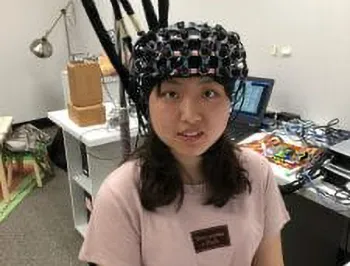
How do cross-linguistic differences impact bilinguals’ morphological processing? Does L1 morphological typology influences processing of L2 inflectional morphemes? There is evidence to suggest that L1 morphological features influence patterns of neural activation in L2 derivation and compounding processing. However, little is known about cross-linguistic influences on inflectional morphology. We compare patterns of neural activation for inflectional morphology processing in bilingual speakers of different languages: Spanish-English and Mandarin-English bilinguals, and English monolinguals. Languages differ in morphological typology along a continuum from synthetic to analytic. Spanish (synthetic) has a complex inflectional system, while Mandarin Chinese (more analytic) lacks inflection but uses a rich compounding process. English, as a moderately analytic language, utilizes a less developed inflectional system compared to Spanish. By comparing these contrasting language pairs, we test how different L1 features influence L2 processing and increase our understanding of language organization in the bilingual brain.
Team: Dr. Li Sheng (UDelaware), Danyang Wang (PhD Student)
Tracking the Neuroplasticity of the Speech Cortex and Language Outcomes in Children with Cochlear Implants
Hearing loss is one of the most common birth defects in the United States affecting approximately 3 in 1,000 newborns. Depending on the degree of hearing loss, deaf and hard-of-hearing (DHH) infants receive interventions that may include cochlear implants (CI). Nevertheless, there is a huge amount of variability in these children’s linguistic and academic outcomes. The amount/type of therapy that children receive, as well as the language input they are exposed to are thought to contribute (to some degree) to this variability. Additionally, the age of implantation is considered one of the strongest predictors of language outcomes for DHH children, since lack of exposure to sound early in life affects the development of the brain’s auditory processing areas. But not all children implanted at the same age achieve the same language skills. Could there be factors at the neural level that make it easier (or harder) to process speech and acquire language once the brain gains access to sound through the CI? The mechanism by which the brain adapts to a new sensory modality following implantation and begins to perceive the relevant speech stream in a range of listening environments (including noisy contexts that may negatively impact speech processing), and the implication for developing language skills remain poorly understood. We combine two cutting edge technologies (fNIRS and eye-tracking) to examine dynamic changes in neuroplasticity and organization of neural pathways for speech perception and language skills right after implantation. Our research may help predict language outcomes and explain the high degree of individual variability observed in children with CIs. Children requiring additional support could be identified earlier, preventing language delays and later academic problems.
Research Team: Shakhlo Nematova (UDelaware, PhD Student), Dr. Giovanna Morini, Communication Sciences and Disorders, University of Delaware; Dr. Thierry Morlet, Nemours Children’s Health System
Funding: UD Research Foundation